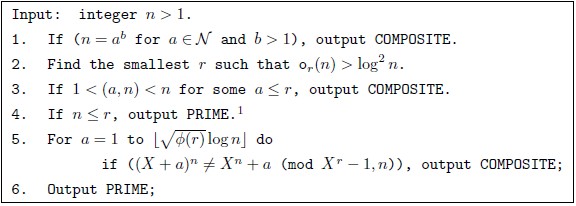1. 解题思路
AKS算法整体包括六个步骤,它本身相当于一个过滤器,只有经过各种条件筛选以后的数才是素数。步骤如图 1所示。
- Step1就是判断n是否是一个数的幂次方形式,如果是的话就表明n是合数,程序结束。
- Step2需要找出比(log2n)2大的最小的欧拉函数r。
- Step3是找出gcd(a,n),如果存在a<=r的情况,则输出合数
- Step4表明如果n<=r,则输出素数。
- Step5是最麻烦的一部,其中涉及到了多项式取模运算,对于多项式的取模运算我们这里使用了一个叫做NTL的C++类库。对一个多项式取模结果进行判断,如果对于某个小范围的a,只要存在多项式,模运算结果不等的情况,则输出宿舍。
- Step6表示经过了前面多个step的过滤,依然存在的数就是素数。

程序源代码如下:(用到了NTL类库,使用方法参考前面的几篇博客)
 View Code
View Code
#include<math.h> #include<time.h> #include<stdio.h> #include<stdlib.h> #include<iostream> #include <NTL/ZZ.h> #include <NTL/ZZ_p.h> #include <NTL/ZZ_pX.h> NTL_CLIENT using namespace std; //根据课本中的伪代码,使用Euclid算法求最大公约数。 int Euclid(int a,int b)//a>=b>=0 { if(a>=b) { if(b==0) return a; return Euclid(b,a%b); } else { if(a==0) return b; return Euclid(a,b%a); } } /* 摘自维基百科: In number theory, given an integer a and a positive integer n with gcd(a,n) = 1, the multiplicative order of a modulo n is the smallest positive integer k with a^k ≡ 1 (modulo n). 所以k>=1,且(a^k-1)%n==0. For example, to determine the multiplicative order of 4 modulo 7, we compute 4^2 = 16 ≡ 2 (mod 7) and 4^3 = 64 ≡ 1 (mod 7), so ord7(4) = 3. a^b%r=(a%r)^b%r A(k)=a^k%r=(a*a^(k-1))%r=(a%r*a^(k-1)%r)%r=(A(k-1)*a%r)%r */ int Multiplicative_Order2(int n,int r)//对于大数n此方法无法使用。 { int k=1; while(true) { int temp=pow((double)n,k);//double pow(double,int),因此这里必须进行强制类型转换,不然编译无法通过。 if((temp-1)%r==0) break; //if(((pow(n,k)-1)%r)==0) // break; else k++; } return k; } int Multiplicative_Order(int n,int r) { if(Euclid(n,r)!=1)//如果n,r不互质,不存在Multiplicative_Order return -1; else { int k=1,temp=1; while(true) { //根据A(k)=a^k%r=(a*a^(k-1))%r=(a%r*a^(k-1)%r)%r=(A(k-1)*a%r)%r temp=(temp*(n%r))%r; if(temp==1) break; else k++; } return k; } } long MyRand(int n)//产生随机数算法。最高时9位。超过9位时会出现负数。 { static int inited=0; long X,k=1; int i; if(!inited) { srand((unsigned)time(0)); inited=1; } if(n==1) return rand()%10; else if(n==2) return (rand()%9+1)*10+rand()%10; for(i=0;i<n/2+1;i++) k*=10; for(i=n/2+1;i<n-1;i++) k*=10; X=(rand()%9+1)*k+((long)(rand()%k)*(rand()%k))%k; if(X%2==0)//如果产生的随机数是偶数,那么+1使之成为奇数。偶数肯定不是素数。 X=X+1; return X; } //step1: //If n = a^b for integers a > 0 and b > 1, output composite. //a,b为整数,且b>1,那么b>=2,那么a<=sqrt(n) bool IsPower(int num) { if(num==1)//如果num=1,那么1=1^x成立,其中x为任意大于1的整数。 return true; else { for(int a=2;a<=floor(sqrt((double)num));++a)//判断n = a^b是否成立只需要让n不断除以a,若最后结果为1则表明成立。 { int temp=num; while(1) { if(temp%a!=0)//出口1:判断num能够整除a,如果不能整除,n = a^b肯定不成立 break; else//如果能整除则除以a以后再去判断能够整除a。 temp=temp/a; if(temp==1)//出口2:temp=1 return true; } } } return false; } //step2: //Find the smallest r such that or(n) > log2(n). int get_Smallest_r(int n) { int r=2; while(true) { if(Euclid(n,r)==1) { int multi_Order= Multiplicative_Order(n,r); //cout<<n<<" "<<r<<" "<<multi_Order<<endl; if(multi_Order>pow(log((double)n),2)) return r; //break; } r++; } //return r; } //step3: //If 1 < gcd(a,n) < n for some a ≤ r, output composite. bool a_r(int n)//返回true表示合数,返回false表示素数。 { bool flag=false; int r=get_Smallest_r(n); for(int a=1;a<=r;a++) { if(Euclid(a,n)>1&&Euclid(a,n)<n) { flag=true; break; //return true;//output composite. } } return flag; } /*欧拉函数 摘自维基百科:在数论中,对正整数n,欧拉函数是小于或等于n的正整数中与n互质的数的数目。 例如Euler_Totient(8)=4,因为1,3,5,7均和8互质。 */ int Euler_Totient(int r)//r>=1 { int count=0; int i; for(i=1;i<=r;i++) if(Euclid(i,r)==1)//如果i和r互质 { // cout<<i<<endl; count++; } return count; } int Congruence ( long a , ZZ n , ZZ r ) //step5 { ZZ_p::init(n); //mod n ZZ_pX b = ZZ_pX(to_long(r),1)- 1;// b = xˆr−1; ZZ_pX c = ZZ_pX( 1 , 1 ) - a;// c = x−a ; ZZ_pX f = PowerMod( c , n , b) ;// f=(x−a ) ˆn mod c , n which is the RHS ZZ_pX e = ZZ_pX( 1 , 1 ) ; ZZ_pX g = PowerMod( e , n , b) ;// xˆn mod b , n g = g-a ;// g1 = xˆn−a mod c , n . if ( f==g ) { //cout<<"prime"<<endl; return 1 ; } else { //cout<<"not prime"<<endl; return 0 ; } } //返回true表示素数,返回false表示合数。 bool AKS_IsPrimality(int num) { if(IsPower(num))//step1 return false; int r=get_Smallest_r(num);//step2 if(a_r(num))//step3,存在a ≤ r,使得1 < gcd(a,n) < n 成立。返回合数, return false; if(num<=r)//step4 return true; //step5 long a; long b=floor(sqrt((double)Euler_Totient(r))*log((double)num)); for(a=1;a<=b;a++)//对于区间的所有数,如果都不满足条件,则返回合数 { int f= Congruence (a, to_ZZ(num),to_ZZ(r) ) ; if(f==0) { // cout<<"end in step5"<<endl; return false; } } return true;//step6 } int main() { //主程序测试 int n,i; srand((unsigned)time(0)); cout<<"随机数位数:"; cin>>n; for(i=0;i<20;i++) { long mr=MyRand(n); bool flag=AKS_IsPrimality(mr); if(flag) cout<<mr<<" is prime"<<endl; else cout<<mr<<" is not prime"<<endl; } cin>>n; /*测试:int Congruence ( long a , ZZ n , ZZ r ) //88903,5 ZZ a, b, c; cout<<"a=";cin >> a;//n cout<<"b=";cin >> b;//r for(c=1;c<b;c++) int f= Congruence ( to_long(c) , a, b ) ; */ /* int n=1342342; bool flag=AKS_IsPrimality(n); if(flag) cout<<n<<" is prime"<<endl; else cout<<n<<" is not prime"<<endl; */ /*测试:int Euclid(int a,int b) int a=7001,b=54643; int c=Euclid(a,b); cout<<c; */ /*测试:int Multiplicative_Order(int n,int r) int a=9,b=7; int c= Multiplicative_Order(a,b); cout<<c; */ /*测试:long MyRand(int n) int n,i; srand((unsigned)time(0)); scanf("%d",&n); for(i=0;i<20;i++) printf("%ld/n",MyRand(n)); */ /*测试:bool IsPower(int num) int n=10001; if(IsPower(n)) cout<<n<<" is power"<<endl; else cout<<n<<" is not power"<<endl; */ /*测试:int get_Smallest_r(int n) int n=7000; cout<<"Smallest_r:"<<get_Smallest_r(n)<<endl; */ /*测试:int Euler_Totient(int r)//r>=1 int r=8; cout<< Euler_Totient(r)<<endl; */ return 0; }
